#your girl doing some chill literary analysis
Explore tagged Tumblr posts
Text
I am BEGGING (some of) you to learn what a literary foil is:
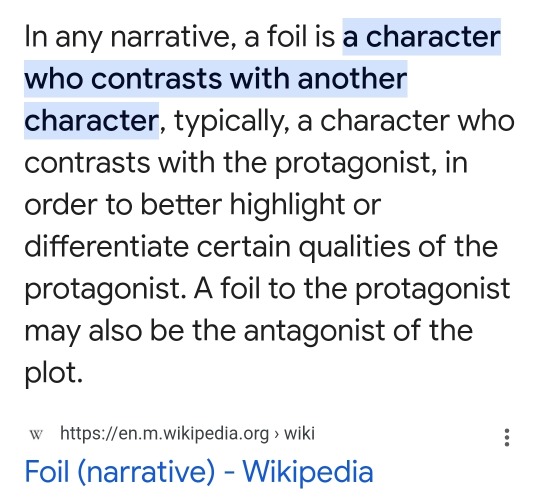
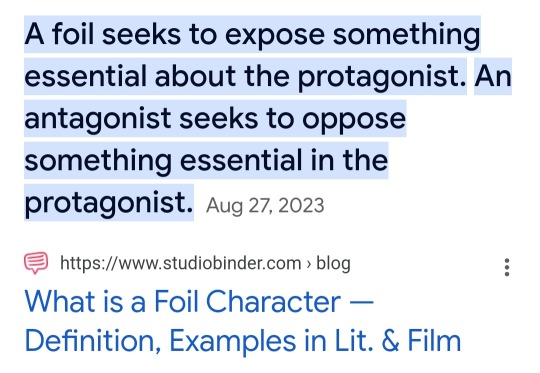
Examples:
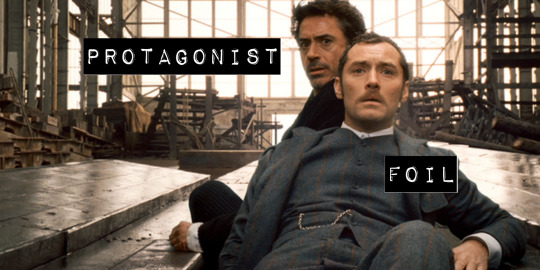
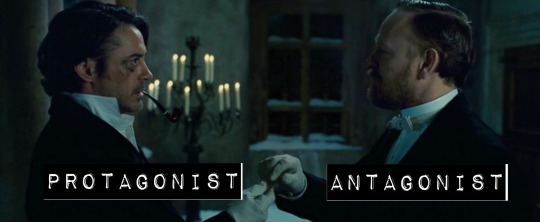
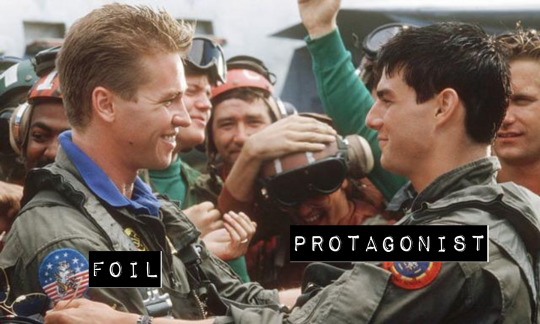
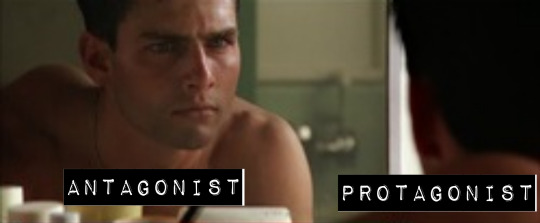
Thank you for coming to my TED Talk.
#Your girl doing some chill literary analysis#If I read one more time that Iceman Kazansky is the antagonist of Top Gun it will become my villain origin story
100 notes
·
View notes
Text
Oh man, YES. THANK YOU.
omg this got so so long, so here is a cut
The first time they go up, Rooster is intense and focused. He even warns the other pilots not to fuck around, and it's absolutely not just because he knows what a skilled pilot Maverick is.
I think current fanon draws Maverick a lot softer than canon suggests. He is a sweet, charismatic, intensely lovable man, but that's not all he is. Keep in mind that he has lived his entire adult life in the military. He is a veteran of multiple wars. He's a maverick, sure, and he has some impulse control problems even at work, but he is dedicated, driven, and deeply committed to his job. This is true even in the first movie:
MAVERICK: And you think I'm reckless! When I fly, I'll have you know that my crew and my plane come first!
By TGM, Maverick is fully committed to being an excellent pilot and serving the mission and the men and women he flies with. He puts his career on the line to further the research of the Stella Tenebris team after Cain shuts Darkstar down. He is dedicated and serious about his work, and he expects the same of others.
MAVERICK: Why are they dead? PHOENIX: We broke the 300-foot ceiling, and a SAM took us out. MAVERICK (to Coyote): No. Why are they dead? COYOTE: I slowed down and didn’t give her a warning. It was my fault. MAVERICK: Was there a reason you didn’t communicate with your team? COYOTE: I was focusing on … MAVERICK: One that their family will accept at the funeral.
Maverick doesn't give his students any quarter. He is intimately familiar with the stakes of the work they do, and he doesn't hesitate to remind others if he thinks they've become complacent. And as hard as he is on the other students, he's even harder with Rooster:
MAVERICK: Why are you dead? You’re team leader up there. Why are you, why is your team dead...? ROOSTER: We made it to the target. MAVERICK: And superior enemy aircraft intercepted you on your way out. ROOSTER: Then it’s a dogfight. MAVERICK: Against fifth-generation fighters. ROOSTER: Yeah. We’d still have a chance. MAVERICK: In an F-18. ROOSTER: It’s not the plane, sir, it’s the pilot. MAVERICK: Exactly!
He's stern with the other pilots, but he is actually angry with Rooster for almost this entire exchange. He holds him to a higher standard. He should know better. He shouldn't be resting on his laurels; he shouldn't be giving excuses. He should know better. I raised you better than this. There's definitely fear involved—
MAVERICK: Ice, please, don’t ask me to send someone else to die. Please don’t … don’t ask me to send him.
—but Maverick is also willing to take exactly none of Rooster's shit. Until it reaches a boiling point, Maverick ignores or laughs off most of the other pilots' hijinks. He lets them call him Pops. He lets Hangman and Coyote literally throw him out of the Hard Deck. He agrees to Fanboy and Payback's bet. He lets Hangman run his mouth until he sees it escalating past shit talk. But his interactions with Rooster are governed by different rules.
I imagine that things would have been very different if Goose hadn't died. He would have been fun Uncle Maverick who served ice cream for breakfast and took Bradley to his first R-rated movie and listened to him blow off steam about his parents. But being a parent is not the same as being the fun uncle. And since we know that Maverick "was trying to be the father [Rooster] lost," it's a safe bet that Maverick's Serious Parent Behavior began as soon as Goose died. Even while Carole was alive, even when/if he was not a full-time parent to Bradley, when he was there, it follows logically that Maverick was just as dedicated and serious about raising Bradley right as he is about his work as a pilot. Your job as a parent is not just to keep your kid alive. It's not just to make sure that, while they're growing up, they're loved and cared for. Your job is to help them grow into adults. If Maverick takes this job seriously, and all available evidence shows that he does, he's going to treat it the same way he does his other job. Take Maverick and Rooster in the classroom post hop, and apply it to Maverick and Bradley in typical parenting situations. Bradley's report card isn't great. "Are you not planning on going to college? You need to take this seriously. This stuff matters." Bradley drives home after a couple of drinks at a party. "You could have killed someone! Do you realize that? You could have ended someone's life!"
Yes, Maverick is a fun guy. And I'm sure he brought a lot of that to parenting. But he knows when fun is appropriate, and he knows when you can get away with shit and when it's time to be responsible and work.
I know this was not the topic of the original post, but I'm going to branch out a little bit, because I am an Icemav fan, and tbh my favorite exploration of Maverick bringing up Bradley comes from omnidirectional's Mr. Blue Sky and Who Watches Over You, in which Maverick and Ice raise Bradley together. I also think Ice-as-a-father is a good counterpoint to Maverick-as-a-father. Some lines from Mr. Blue Sky*: "Pops (Maverick) always has a storm of some kind blowing through; they wash away as quickly as they spring up, but Dad (Ice) is Bradley’s clear blue sky." "Dad’s always been the granite bedrock of their family." "Dad’s the peacemaker."
*I know this isn't canon, and I'm not quoting it as such, but it fits into what I see as the most likely outcome.
In recent fanon, I see a lot of "Ice is the strict parent who enforces all the rules, and Maverick is laissez-faire and only there for fun stuff" Icemav-Bradley interactions, and given what we're shown in canon (see basically everything I wrote above about Maverick and Rooster in TGM) and what we know about both Ice and Maverick as characters, I think that's unlikely. I spoke more about this in Maverick Mitchell is Neurodivergent post, but there are two skills Ice has mastered that Maverick has not: emotional regulation and letting things go. (If you read my post, you'll see that "letting go of shit" is really a subcategory of emotional regulation, but for right now, I'm going to treat them as separate topics.)
Maverick has big emotions, and since he has poor emotional regulation, it's more like his emotions have him. How he feels is going to influence every decision he makes. People who can emotionally regulate well are able to consider both their emotions and facts and logic when making decisions, but people like Maverick have difficulty discounting their feelings even if they're not based in fact. Even if they know they're not based in fact. Ice can compartmentalize. He can make decisions based on both emotion and logic, and it's very easy for him to see others' points of view. He's diplomatic. He's made a career out of it. He's very unlikely to get heated in communication even when he's upset. (If he makes the effort to be cool. I'm sure that's not always the case.) Think about the scene in the locker room in the first movie, where he's taking Maverick to task again about his regard for others' safety. He speaks softly. He's serious, but he's not confrontational. He already tried confrontation, and it didn't work, so he just quietly says his piece and then leaves Maverick to chew it over.
If Maverick is angry or frustrated about something Bradley did, when he talks to him about it, that's going to come out. Ice can keep that stuff to himself. It's not going to make him a pushover, but it's going to be a marked contrast in parenting styles. And omnidirectional is right: It's absolutely the characteristics necessary of a peacemaker. Ice is a diplomat; he can mediate. It's in his nature. Neither Maverick nor Bradley have the temperament to do this. At their worst, they're the unmovable object and the unstoppable force, and they'll just push and push and push against each other without ever giving way. Without ever moving at all. Ice is fluid. He gives. It's not weakness; currents can be strong enough to topple dams. Over time, rivers carve canyons. But it's a different kind of strength.
And letting things go. Like I said, Ice is fluid. When the terrain shifts, it's easy for him to change course. At the end of the first movie, after Maverick showed Ice that he had learned from his mistakes and that he was a worthy wingman, Ice embraced him—figuratively and literally—without hesitation. He told him, "You can be my wingman anytime," and he lived that promise for the rest of his life. And he was Maverick's wingman in return. He spent years fighting for Maverick's place in the Navy because Maverick proved to him over and over again that he was worth it. That he belonged there. Ice changes when he has to. He lets go of things. He doesn't hold a grudge against Maverick for anything that happened between them in the early days of their relationship. He lets all of it drop in a moment. He lets go of being a pilot when the Navy needs something else from him. And he accepts death when it comes for him because he knows it's inevitable, and sometimes it's just time.
Maverick can't.
ICE: It's time to let go. MAVERICK: I don't know how.
Maverick can't let go of anything. He can't let go of the guilt and pain of Goose's death over three decades before the events of TGM. He doesn't know how to let Rooster leave the nest when there's even the slightest chance Maverick could still protect him. He doesn't know how to let Ice go when Ice's death is inevitable and there's simply no battles left to fight.
Rooster is in his 30s when Maverick trains him for the mission in TGM. He is a grown man. He is a skilled and accomplished pilot, and has been making his own way in the world for many years. But the minute Maverick has the chance to act as an authority figure again, the fear Maverick has about losing him comes rushing back, because he's never let go of it. It's hard for him to even wrap his mind around the idea that, if given the chance to spread his wings, Rooster will realize his potential and fly strong, because Maverick has not let go of little Bradley learning to ride a bike without training wheels and riding off away from him. He hasn't let go of the idea that Rooster needs his protection. He can't move with the changing landscape of Rooster being a man and forging his own way, even though that has been reality for a long time. Maverick chooses Rooster to be his wingman because he wants to believe in that reality, but in truth, he goes into the mission willing—if not expecting—to give his life to protect him.
MAVERICK: Don't ask me to send someone else to die.... Send me.
maybe unpopular opinion and I only have an opinion because i've seen a lot of fanon interpretations of what mav would have been like as a father/primary caregiver to bradley because like it's constantly in my icemav...but I don't think mav would have been an extremely permissive parent. i don't know how to put it but i see a lot of fics where mav is portrayed as a very soft, pushover sort of parent and nothing about how mav interacts with bradley in tgm, especially the training sequences, makes me think it would be true. plus he says he was trying to be the father bradley lost and I think he would take that responsibility very seriously. I'm sure he would be a fun and chill parent. but one a kid would know not to push their luck with
#top gun#top gun: maverick#maverick mitchell#rooster bradshaw#iceman kazansky#maverick and rooster#ice and rooster#top gun discourse#your girl doing some chill literary analysis
350 notes
·
View notes
Note
Hello, I require your infinite wisdom please!! :O So I just finished cowboy bebop and I am so confused like who the fuck was Julia. WHAT was Faye's past. I literally never process tv shows and the bebop was not immune to my stupidity LMAO like... I guess the ending just really confused me, from what I gathered Spike and Vicious were friends? But then they weren't? And Julia dated Vicious but also Spike? And he? Went after Vicious even after Julia had died? I am Confusion. Please help. Thank u...
Oh BABEY I am so glad you asked! :) Be prepared for a long answer and I apologize in advance for how incoherent it will probably be.
ALSO Please note: this show is fucking complicated. I have watched it all the way through several times a year, every single year, for over a decade now, and I am *STILL* finding new shit every time I watch it. It's packed with symbols, motifs, allusions and underlying themes that are just so rich. It is so extraordinarily well-written that it could give a lot of classic literature a run for its money. I'm literally working on an in depth literary/film analysis my husband lovingly calls my Manifesto on the series right now. SO PLEASE don't beat yourself up about not catching everything on the first go round.
HEY BTW for anyone who hasn't finished the show, please know there will be MANY spoilers ahead!
Anyways ~
1. Spike / Julia / Vicious:
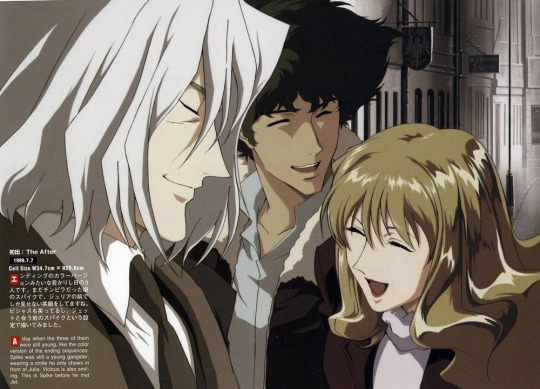
The information we get on Spike's past, including Vicious and Julia, is pretty limited considering how big of an impact they have on the story. We get our first glimpse in Session 1: Asteroid Blues, then again in Session 5: Ballad of Fallen Angels, Sessions 12 + 13: Jupiter Jazz, and Sessions 25 + 26: Real Folk Blues. I recommend reviewing these episodes for you Julia and Vicious fix.
What we know:
Spike and Vicious were both members of an organized crime syndicate called the Red Dragons, which is roughly analogous to the Yakuza or the Mafia. Their positions in the organization are not clear, but there are some images alluding to them being hitmen, and they likely rose up in the ranks as they were close acquaintances of Mao Yenrai, a Capo of the Red Dragon.
Spike and Vicious were close comrades. Spike taught Vicious everything he knew about fighting, and the two had a deep trust in each other. Which Spike fucked up ….

^^Vicious looks hot asf here
Julia was Vicious' lover/girlfriend. One night in 2068 (three years prior to the time we watch in the Bebop) Spike is injured, presumably from a syndicate-related fight and he passes out in front of her door. She takes him in and nurses him back to health and he SIMPS HARD for her. We’re all but told he's in LOVE love with her. They start an affair, and Spike tells her he's ready to abandon the whole life - the syndicate, Vicious, Mao, all of it - and they could run away together.
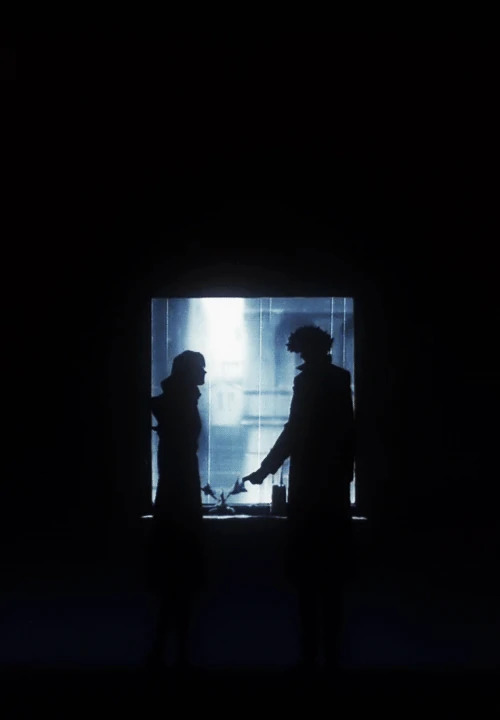
WELL Vicious finds out about this whole affair, and is DOUBLY betrayed because his literal best friend and girlfriend have been having an affair, and tbh I think he was just as jealous of Spike's attentions as he was of Julia's. (Whether or not it’s a sexual thing for Spike … well … I have my own headcanons about that). SO when he finds out they're going to run away together, he gives Julia an ultimatum: you can either kill him, or I'll just kill you both. Spike had written her a letter about meeting him in the graveyard to start their new life together, which she tears up to hide his location from Vicious. (This is the falling ripped up pieces of paper we see in Spike's flash back in Session 5).

^^ r/gifsyoucanhear
**NOTE: There are those who disagree with this view, (looking at you Cowboy Bebop wiki) instead suggesting Vicious and Spike were buds in the past, but then hated each other once they were both considered as potential successors to Mao. That's why Vicious wanted him dead, and he was enlisting Julia (who he didn't necessarily have a romantic connection to) to help kill Spike since he knew Spike loved her. Personally, I think there is plenty of evidence that Vicious also wanted Julia, and in fact was already with her, when Spike started seeing her. If you want me to cite my sources please send an me an ask about it :)
Spike gets the idea, whether by her just not showing up or word around the syndicate being like YO Vicious wants you dead. Despite Vicious' ultimatum to Julia, he was gunna kill Spike either way. SO he sets up an ambush, and SadBoy™ Spike walks intentionally into their trap. Somehow, he doesn't die, though the entire syndicate thinks he did. (Note Annie's reaction to seeing him alive in Session 5). It’s also implied that this is where he lost his eye.
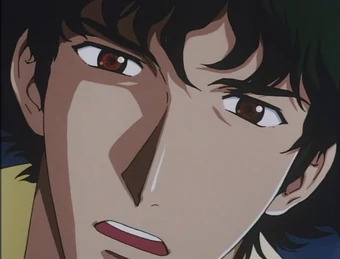
HIS EYE - possibly the most important symbol in the show so I do have to mention it. In episode 26, he explicitly explains to Faye that one of his eyes only sees the past. (PS this isn't dissimilar to Jet's arm… we can get into that another time). Basically, he's constantly living halfway in the past and halfway in the present, and describes the past like a dream he can never wake up from. Because dysfunctional or not - the syndicate WAS his family. (Again - see his relationship with Annie, Mao, and Vicious (prior to Spike's betrayal)). It's his reminder that Julia didn't run away with him, and that he'd left behind that life for her. (He didn’t know she was being threatened until the final episode). Basically Spike is hyper-fixated on what he had and what could've been.
Not long after this, Spike starts bounty hunting because like? What else is he going to do. He doesn't care if he lives or dies but if he has to be alive, he may as well be able to eat. He joins up with Jet Black on the Bebop.
TL; DR: Spike stole Vicious' lover, Julia, so Vicious made Julia choose between her killing Spike or Vicious killing them both. She instead went into hiding and Spike thought he'd been stood up. He fake died and got the hell outta dodge.
2. What was Faye's past?
Ok let me start by saying Faye is my wife and my life. HOWEVER I hated her the first time I watched this show circa age 13 because I thought she was annoying/vain/shallow (also because #internalizedmisogyny lol am I right fam). Good news! She is all those things! But she's also very lonely and scared and an amnesiac and secretly a sweetie and she realizes she loves the crew of the Bebop like family.

SO my wife's backstory:
she was born in the 1990s (#only90skidsremember). There's some debate over her race/nationality, but due to the images of her hanging out in Merlion Park in Singapore, my bet is that she's Singaporean. She comes from a wealthy family with a big house, and we see some utterly *adorable* film of her as a child/young adolescent in Session 18: Speak Like a Child. I cry everytime </3
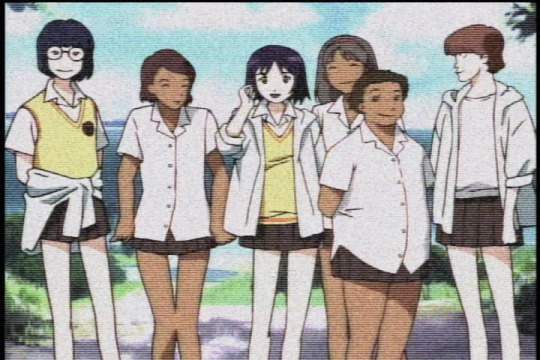
^^ Holla for the representation
In 2014, circa age 20, she and her parents were going into space when the shuttle they were on had some kind of malfunction/accident and it killed an unknown number of people, including her parents. At the time, the technology didn’t exist to be able to save her, so she was put into a cryogenic sleep state. Meanwhile, the Lunar Gate accident occurs, breaking up the moon and causing rock showers on Earth's surface. Most people died, moved to Mars, or settled underground.

She wakes up from her cryogenic sleep in 2068. (Also the year Spike leaves the syndicate.) She's 'woken' by the corrupt Dr. Bacchus who plans on charging her for the years and years of medical debt she's accrued. (See Session 15: My Funny Valentine.) Luckily a lawyer takes interest in her case (Whitney Haggus Matsumoto) and tries to help get rid of her debt. The two fall in love, but turns out Whitney is a Scumbag. He's actually Dr. Bacchus's nephew, and faked his death, writing Faye as the sole inheritor to his will. This means she'll take on all his debts. So baby girl has LOTS of debt at this point.
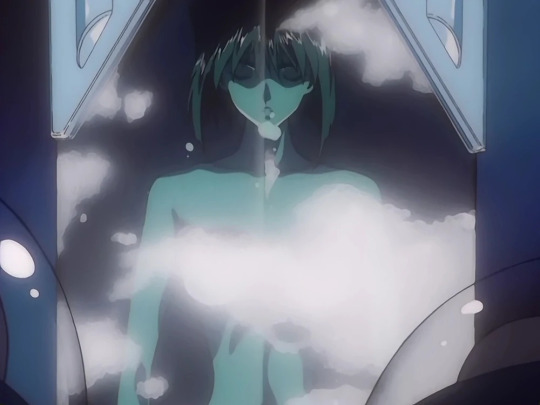
In the intervening years prior to her joining the Bebop, she gambles, cheats, gains a lot of street smarts, and adopts a very seductive character to get her way. She joins the crew on the Bebop in Session 3: Honky Tonk Women.
TL;DR: Faye is Austin powers
YIKES this is so long I am so sorry. Bitches are obsessed with this show. (I am bitches)
3. The Ending
Okay I'm going to present this in the way, in my scholarly opinion, would be correct, though there are SO many interpretations other than simply 'Spike died :/".
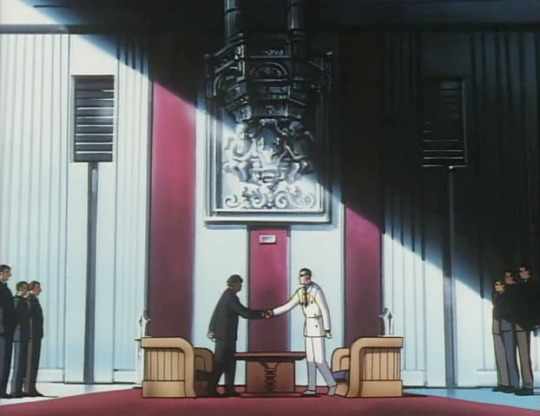
To understand the plot of the last couple episodes we actually have to go back to Session 5: Mao is instructed* to sign a treaty with a rival syndicate called the White Tigers. (*He's instructed by The Van (Council of identical creepy old men) who are the actual head of the dragon. I think we only see them in Session 26.) Well - Vicious is a Bastard Man and he and his fellow mutineers blow up the White Tiger guys' ship and slit Mao's throat. Before he dies, Mao is like "Gotdamnit if Spike was still here this shit wouldn't have happened." Later in the Cathedral battle, Vicious explains to Spike he killed Mao because Mao 'lost his fangs'. He planned on killing Spike for good her, IMO, so there'd be no rival to take over as Capo for the Dragons.

^^These guys are The Van btw
THEN in Session 25, the Van basically catches Vicious and is like “you killed Mao and now you have to go to Time Out.” The Van also decides to just kill everyone associated with Vicious, just 2 B safe. That's why there's a big ass shootout at the Loser Bar where Jet and Spike are chilling, drinking, (missing Faye and Ed and Ein lol) and Shin (younger brother to Lin, who's helping Vicious overthrow the Dragon) explains all this to Spike. OH and PS JULIA IS ALIVE AND HERE IS HER LOCATION :). (**Notice Spike's reaction at this point is different than his reaction in Jupiter Jazz when he hears there's a Julia on Calisto. Much less excited… hmm…).

SO THEN you know we get some flashbacks of the past as previously explained *and* Julia just happens to run into Faye. She recognizes that Faye is one of Spike's friends from the Bebop (she was keeping tabs on him it seems) and picks her up. Faye doesn't know who Julia is but is like damn bitch I'm a little gay for you. (I mean … that may just be my bi ass projecting, but Faye is REALLY struck with her. Look at how she describes her to Jet, I mean come on.)
Faye's like, 'we should team up' and Julia says 'no thanks but also tell Spike to meet me at *the place*'. Meanwhile back on the Bebop Spike and Jet are talking and Spike goes on about some dream woman who was his other half. (We assume he means Julia … I have my reasons to doubt this … I have a lot of angry DMs about my opinion here lol but I just do not give a fuck (: I can expand on this in another post or you can refer to the title of my fucking blog haha) Personally, I think Watanabe personally left this specific scene open ended, the same way he does with the ending and various other things.
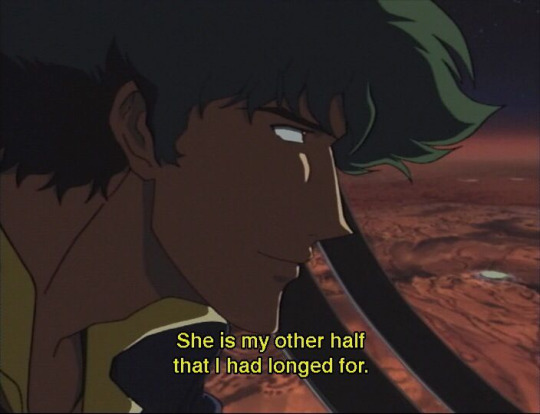
more like SIMP Spiegel
ANYWAY Faye comes back to the Bebop to tell Spike about Julia, and Jet gets intel from a former cop buddy that there's some shit going down with the Dragons. (Again, the Van is hunting down everyone ever associated with Vicious, including your pal Spike). Bebop is attacked, Faye tells Spike what's up with Julia, and he heads out.
PAN TO VICIOUS chained up - about to be executed - but what's that!? It's a bird!? It's a pla- no it's just a bird. (With one glowing red eye … hm … reminds me of Spike, also the drug Red Eye. Pls let me know if you have any thoughts on this). Just a bird with a BOMB! Explosion (RIP bird c. 2065 - too soon), Vicious kills the elders, his buddies show up and are ready to go fuck shit up.

this show could not be more of an aesthetic
MMMPhhh okay RAINY CEMETERY. Spike and Julia. She draws a gun, explains why she didn't meet him that day, and then hugs him. Now Spike is not *great* at showing his emotions but he literally just stands there. Maybe it's a stoic expression of how sad he is that he never knew she still cared, when it seemed like she dumped him. Maybe he's finally getting some closure on his past. Maybe the past doesn't mean the same thing it used to. (I'll elaborate later on this).
They go to Annie's to get stocked up on stuff, she lets them know she denied knowing Spike was still alive and hey also the Van was assassinated by Vicious and his guys so. Watch out for that. Then her shop is surrounded by Vicious' guys and she dies :(. Spike and Julia escape to the roof, but she's shot and dies in Spike's arms, and says 'it's all just a dream' :(. (Refer to: Spike living in a dream of the past).

Anyway Jet SAID he wasn't gunna go after Spike but. Jet's parental instincts kick in (oh yeah he was shot in the leg earlier btw) and he goes to Sitting Bull to see if he knows where Spike is. He basically says yeah Spike's about to die somewhere. (I want to do a further analysis on all the Sitting Bull scenes.) Well conveniently Spike returns to the Bebop, eats, tells his story about a tiger-striped cat. (At one point Jet asks if he's going there for her, and Spike is like well she's dead now so whatever). THEN we get to the scene where Faye is like HEY YOU CAN'T GO OFF AND DIE ASSHOLE and he's like ¯\_(ツ)_/¯ I 've been living in the past so I might as well see if I'm living now. (**This will play heavily into my interpretation of the ending). Faye is pissed, shoots the ceiling and he goes off to the syndicate headquarters to fuck shit up.

He basically John Wicks his way through the building, Shin dies, he and Vicious have the big boss battle and whatnot. He kills Vicious and stumbles back out down the stairs and says "Bang!" and collapses. We pan to the sky and see a star fade away.
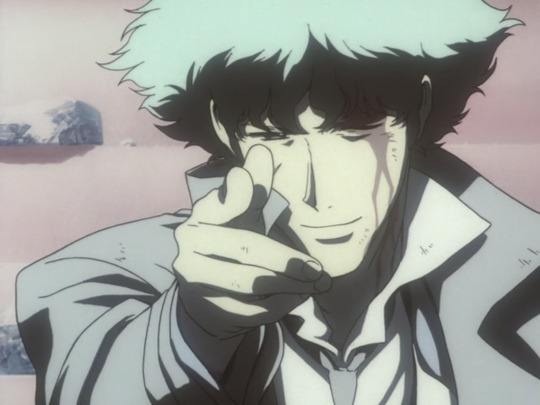
Well that explains the plot … now here's what I think happened!!! ALSO may I mention, anon - you picked up on something I feel like a lot of people miss out on. Why *did* Spike go back to kill Vicious if Julia was already dead??
Basically, once it became clear that anyone associated with Vicious was being killed, Spike knew they'd hunt him down, and they weren't beneath Kill-Billing their way to him, (i.e. systematically destroying this companions to get to him). And for all his apparent indifference - he really loves his new found family. Jet is literally like an older brother to him. Ed is a little sister. Ein is well … a very good boy. And Faye? Well the relationship is complicated, and I'm not going to get into the 69,420 reasons I ship them here, but I think it is beyond argument that he really does care for her, even if that just in a filial way. He didn't want the syndicates to kill them for their association to him, or in order to get to him. So he did what he had to do to protect them. *AND NO* I am not saying that he didn't love Julia. But it was clear that his desire was no longer to run away with her. I think he genuinely loved and cared about her, but at some point between Jupiter Jazz Pt 2 and now, he accepted that their time together was over. Now he had a new raison d'etre, which is the Bebop.
I think at this point Spike has 'woken up' to reality (as he implied to Faye in their final conversation in episode 26: "Look at these eyes. One of them is a fake, because I lost it in an accident. Since then, I have been seeing the past in one eye, and the present in the other. I had believed that what I saw was not all of reality...I thought I was watching a dream that I would never awaken from. Before I knew it, the dream was all over." (This is from the sub btw I'm too lazy to look up the dub transcript.) He wasn't going there to die, he's going to find out if he's really alive. This line is fucking cool and everything - but it's implications are multitude. I won't go into them all here but basically : what makes him alive now is that he's free from his past. He's alive because he has this new family and protecting them is all he really wants now. Spike was protecting Jet, Faye, Ed, (and Ein) by going and facing the entire syndicate, knowing that their lives would all be in danger.
SO - did Spike die? Well again - Watanabe has purposely and artfully left this open ended. Well, if we're following the symbolism from Sitting Bull, then yeah, the man is as dead as disco, and wouldn't that be a fitting ending? BUT at the same time, Spike always refers to having 'died' before (meaning when he was ambushed by the syndicate, and they all thought he died, and he pretty much did). Don't forget that in movie (takes places roughly between episodes 22 + 23, and yes, was made AFTER the series but whatever) he like .. DIES dies. He goes to the afterlife and everything. He wakes up to find he's chilling with Sitting Bull, who's like nah it wasn't your time to die yet. So the fact Sitting Bull confirms Spike will die in the final episode, means yeah, Spike is pretty much dead.
BUT -- okay now hear me out -- could this death in the final episode be a death to his previous life? The person he was in the syndicate? Now that he's extinguished the Red Dragons for good, is it not possible that its merely *that* life which has ended? That's the optimist in me saying that, but if it keeps me from staying up all night crying, I guess it'll have to do. Watanabe definitely wants to leave it up to the viewer, so whatever you think, I feel like there's validity to it.
WELL any anon, sorry for the fucking lecture - and believe me, I could've said MUCH, MUCH more - but I enjoyed this question. I always love talking about this show so please all you fuckers feel free to message me or send an ask about anything any time. I am really slow at replying because #life'sAbitch.
Love you all.
SY,SCB <3
#sorry for the long ass rant#i could seriously talk about this all day.#i even trimmed this down so much#cowboy bebop#fuck man this show is everything#spike spiegel#julia#faye valentine#jet black#vicious#radical ed#ein#<3#spoilers#rant
112 notes
·
View notes
Text
Scholarly Analysis Is Ruining Our Ability to Enjoy Media
It took me a really long time to get back into reading for fun, as I'm sure is true for many English majors (or American high school students). So much of our time is spent being told what to read and, more annoyingly, how to read it. Studying and analyzing literature has change the way I've consumed all forms of media, and it's taken me a long time to break out of that analytical habit. There seems to be this huge wave of people trying to figure out why something is good or bad, or what things mean, and they're missing out on simply enjoying the piece of media.
When looking for new books to read, I know which genres I prefer, and what kinds of characters I like, but, really, a book can have everything on my list, and still not be completely enjoyable for me. Or, on the flipside, it could be completely outside of my usual zone, and I still find it incredibly enjoyable. I used to spend a lot of time thinking about what it is that I like about things, and why they speak to me on some cosmic level, but it's hard to place. Why is it that Benjamin Alire Sáenz's Aristotle and Dante Discover the Secrets of the Universe one of my favorite books when I tend to prefer fantasy/sci-fi, ensemble casts, relatable characters, third-person POV, and bright narratives? I just don't know.
A thought occurred to me as I flew through Rick Riordan's The Lost Hero in less than a week. This book, nearly 600 pages, was a much quicker read for me than Catherynne M. Valente's The Girl Who Circumnavigated Fairyland in a Ship of her Own Making was, which took me nearly three weeks, despite having about half the pagecount. It wasn't that I didn't enjoy Valente's first Fairyland novel (as I told my roommate, who happens to adore the series, it was a little on the whimsical side for me, but it was still a fun read), but there was something about The Lost Hero that had me hooked in a way that it didn't. I could spend hours and hours analyzing both books, figuring out what it is. But what's the point? Why do I feel compelled to compare? Because I was trained to do so. Both books are parts of series, and I picked up The Son of Neptune pretty much immediately, and already have my eyes out for a suitable copy of The Mark of Athena, but haven't thought twice about The Girl Who Fell Beneath Fairyland and Led the Revels There, and had to look that title up because I couldn't even remember it.
And what I want to stress is: that's okay. I used to feel guilty about starting books (or series) and not finishing them. Reading before bed is part of my evening routine (my cat lays on my stomach and we chill and it's the best), but sometimes I would be so not into a book, that I would skip this step, despite having other books that I wanted to read. I felt like I couldn't start them until I finished what I was already working on. Who made this rule? I certainly didn't, and it took me a long time to allow myself to break it. I made my own rule: if I haven't picked up the book in seven days, it's time to put it back on the shelf and get something new. Because I have this deadline for myself, sometimes I give up even sooner. If I know that I have to put it back in seven days, I might as well put it back after four and move on with my literary life.
As a reader or consumer of any media, you don't have to bend over backwards to justify why you don't like something. Some things just aren't as good as other things, and there's not objective way to quantify it. Books and movies and TV shows and other forms of media are all very complex things; there's a lot of thought and nuance that goes into all of them, and some things are so subtle that we don't even notice. Our brains might subconsciously pick up on them without us realizing it. We, as humans, are also very complex things, and no two people are going to experience even the most simplest piece of media in the exact same way, which is why it's impossible to say with 100% truth that X is better than Y, that The Lost Hero is better than The Girl Who Circumnavigated Fairyland in a Ship of Her Own Making. For all I know, my roommate absolutely despises everything Riordan has written. And, hey, that's okay, too!
Alternatively, you don't have to justify why you do like things. Like I said, I know generally what I prefer, and if I wanted to get really into it, I could probably even tell you why. But I spent so much time analyzing and reporting and just thinking about the goodness of things, that it became tedious and took time away from enjoying either the thing in question, or other things.
The moral of this story is, enjoy media for what it is. Read a book for fun. Enjoy it while you're reading it, and if it resonates with you, that's awesome, but don't spend so much time thinking about why it resonates. There are so many things out there that are meant to be enjoyed. Enjoy them. Then move on and enjoy something else. Or don't. Who am I to tell you how to consume your media?
3 notes
·
View notes
Text

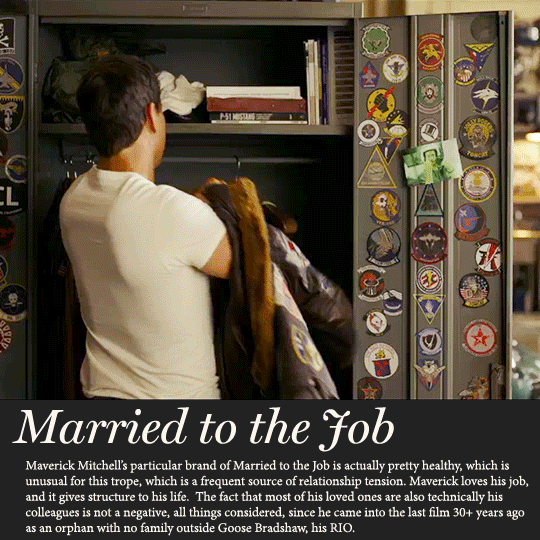

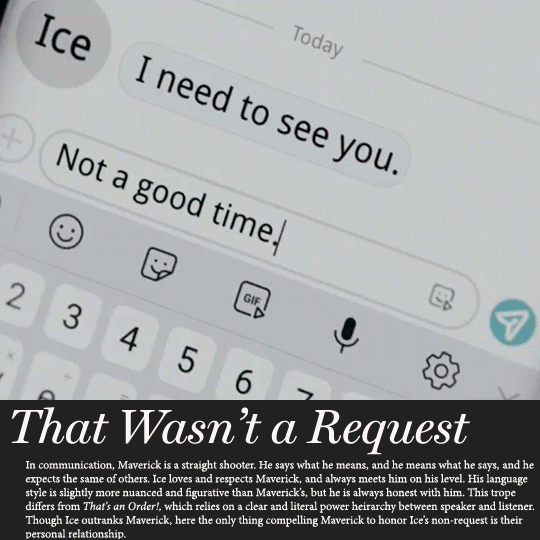

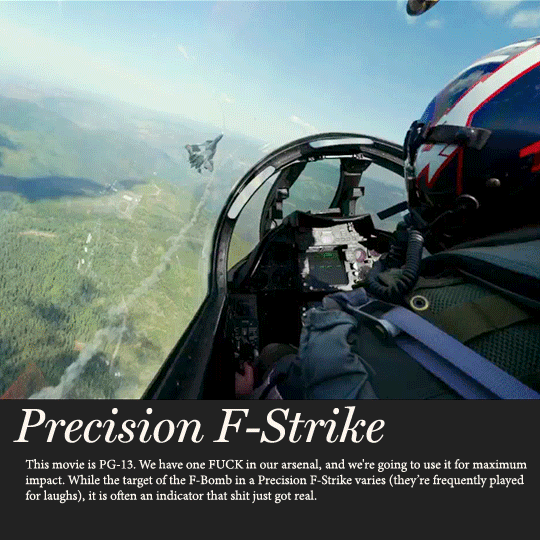

@pscentral event 13: tropes
#top gun: maverick#maverick mitchell#top gun meta#tropes#cinema tropes#film tropes#tom cruise#lit analysis#your girl doing some chill literary analysis#my gifs
487 notes
·
View notes
Photo






“It is his blood—the same blood that was spilled in the grass and snow at Wounded Knee—that runs through your heart, like a buffalo. Thunderheart has come. Sent here to a troubled place to help his people.”
90 notes
·
View notes
Photo

Symbolism in Thunderheart: the Medicine Wheel
The Sioux medicine wheel is broken into four quadrants; each represents different elements and attributes, and each is related to a color and a direction.
Ray's wheel is red and white. Walter's is blue and yellow. Neither has the entire wheel represented, but together they do.
Walter's wheel represents the physical and the spiritual, earth and fire, autumn and spring, the healer and the visionary. Ray's represents the emotional and the intellectual, water and air, summer and winter, the teacher and the warrior.
Ray is at war; he is neck deep in cognitive dissonance, trying to resolve what he has been taught to think with the feelings he can't control. His elements, water and air, are constantly in flux. Walter, meanwhile, is earth--tangible and steady, literally "grounded." He acts as Ray's anchor, his tether, and--the visionary--shows Ray what to see. You must go as two.
27 notes
·
View notes